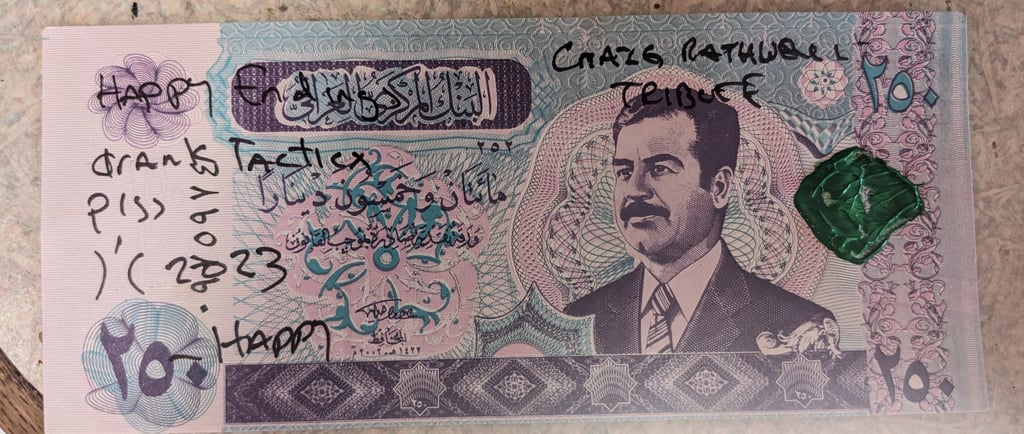Burning Man Nose Waxing & The Evolution of My Currency Gag; The Bill
Origins of the Act: Africa, Zimbabwe, and Hyperinflation


My act at Burning Man didn’t start with Saddam Hussein or the Iraqi dinar. It began with a trip to Africa, where I encountered Zimbabwean currency firsthand. The country had undergone one of the worst hyperinflation crises in modern history, producing bills with absurdly high denominations—trillions of dollars, worthless in the market but fascinating as artifacts of economic collapse. Holding these notes, I saw them not just as failed currency but as symbols of power, manipulation, and the fragility of financial systems. They were also hilarious in their impracticality.
That experience planted the seed for what would become a central piece of my Burning Man act: repurposing obsolete currency as a statement on value, money, and power. The idea of handing out physical notes, ones that had once been legal tender but were now essentially worthless, felt like the perfect blend of satire and performance art. Burning Man's economy is famously based on gifting, so introducing old currency as a kind of ironic "receipt" played into the festival’s ethos while mocking the very idea of monetary transactions.
The Post Office "ATM" and Walking the Playa with a Stack of Bills
Back in the early days of my act, Burning Man still allowed mail services—participants could send and receive letters and packages at the event. This was before people ruined it by shipping in drugs and getting the whole system shut down. At the time, I took full advantage of it in the most absurd way possible: I started mailing myself bricks of devalued foreign currency, jokingly calling the post office my "ATM."
I’d show up, pick up my package of bills, and walk across the playa with a literal foot-tall stack of banknotes. The visual alone was enough to get people’s attention—here I was, carrying around more "money" than most people would see in their lifetime, yet it was all effectively worthless. It was a commentary on inflation, excess, and the arbitrary nature of wealth. Some people saw it as a prank, others as a social experiment, but for me, it was a mix of both.
Experimenting with Different Currencies: Zimbabwe, Afghan Afghanis, Vietnamese Dong, and More
The Zimbabwean dollar was just the start. Over time, I experimented with other forms of defunct or devalued currency. Afghan Afghanis, Vietnamese Dong (which, let’s be honest, calling it the "dong" made it even funnier), and Yugoslavian dinars all made appearances. Each bill carried its own weight of historical significance—failed economies, collapsed regimes, and stories of hardship wrapped in a small piece of paper that once held real power.
Each bill also played differently in the act. Some were more recognizable than others. The Zimbabwe dollar, for example, was infamous for its hyperinflation. The Vietnamese dong had a humorous angle just by name alone. But over time, I started gravitating toward a currency that had an even stronger cultural and political punch: the Iraqi dinar.
Enter Saddam: The Ultimate Prank Currency
Saddam Hussein’s face on a banknote carries a different kind of weight. Unlike Zimbabwe’s comically inflated bills or obscure foreign currencies, the Iraqi dinar represents a moment in history that most Americans remember vividly. The U.S. invaded Iraq under the pretense of "weapons of mass destruction," leading to a war that reshaped global politics and cost countless lives. The fact that no WMDs were ever found only solidified the war’s place as one of the biggest lies in modern history.
The dinar, then, became the perfect currency for my act. It was instantly recognizable, carried deep political meaning, and could be used in an absurd yet thought-provoking way. Telling people to "go do some lines with Saddam"—rolling the dinar into a straw—was a play on both the party culture of Burning Man and the absurdity of using this dictator’s image as a prop for revelry. Lines of what? Who knows—that’s your problem to figure out. It was dark humor at its finest, and it always got a reaction.
There is also a nod to GWAR's message...

Repurposing Currency: Is It Money Anymore?
One of the most interesting aspects of my act is that I don’t use the dinar as currency in the traditional sense—I repurpose it into something personal. Instead of being a medium of exchange, each dinar becomes a custom, handwritten note to the person receiving it. It’s a reflection of our conversation, a token of the moment we shared during their nose waxing. With my Arms of Chaos sealing ring stamped onto it in finger paint, it transforms from a once-official banknote into something else entirely—part artifact, part artwork, part personal message.
This raises an important question: is it still money? It once was, but now it functions more like a keepsake, a subversive form of documentation rather than something to be spent. Unlike fiat currency, whose value is dictated by governments, this repurposed dinar takes on new meaning through the act itself. Some people still joke about trying to trade it, but the reality is that I’ve stripped it of its original purpose and turned it into something completely unique.
The Burner Exchange Rate: Can You Use This Money?
One of the running jokes in my act is the concept of the "burner exchange rate." I encourage people to see if they can actually trade the dinar for something at Burning Man. Of course, in a community where money isn’t supposed to be used at all, this creates an amusing paradox. What’s the value of a worthless currency in a place where currency isn’t supposed to have value in the first place? It adds an unpredictable, chaotic element to the act—sometimes people manage to barter it for something ridiculous, other times they just keep it as a souvenir.
It also sparks conversations about value. Why do we treat some pieces of paper as having worth while others are discarded? Who decides when money stops being money? These are the kinds of questions that fit perfectly within the absurd, experimental nature of Burning Man.
My Supreme Court Challenge and the Fiat Currency Scam
This act ties into my larger philosophy about money—fiat is junk. I took this idea to the highest legal level, challenging the inclusion of "In God We Trust" on U.S. currency in the Supreme Court. The idea that money is backed by faith, whether in a deity or a government, is ridiculous. Fiat currency is built on an illusion—it’s only worth something because people are conditioned to believe it is. The dinar is a perfect example; once valuable, now a relic, just like every fiat currency will eventually become.
That’s why I gravitate toward Monero (XMR) and alternative currencies. Monero represents actual financial sovereignty—privacy, decentralization, and a rejection of surveillance capitalism. While I joke about the burner exchange rate, the reality is that something like Monero is far more valuable than any of these printed bills ever were. The U.S. dollar, the dinar, all fiat—it’s all confetti in the end.

This part of the act goes beyond the humor—it touches on something much darker. The Bush administration’s handling of Iraq, the lies about weapons of mass destruction, and the lasting consequences of U.S. imperialism were some of the most horrific political events of modern history. The invasion of Iraq destabilized the region, led to hundreds of thousands of deaths, and created a cycle of violence that continues to this day. The Department of Homeland Security (DHS) and the Patriot Act were part of the same post-9/11 paranoia that justified mass surveillance, indefinite detentions, and the erosion of civil liberties—all under the guise of national security.
By using Saddam’s currency, I force people to remember these events, even if it’s through laughter. It’s a reminder of how governments manufacture consent for war, how propaganda shapes public opinion, and how we often forget the lies that led to disaster. My act isn’t just about handing out a funny piece of money—it’s a subversive way to keep these conversations alive; including the absurdity of fiat currency being backed by nothing that Zeitgeist describes.

Thematic Layers: Bush, WMDs, and the Aftermath of Imperialism


-Happy (-59)
Conclusion: More Than Just a Gag
What started as a joke with Zimbabwe dollars evolved into a full-blown statement on war, value, and power. Fiat is trash. The dinar, like the U.S. dollar, is just a symbol of a dying system. But at least my version of it has meaning. Perhaps someday the U.S. dollar will fail and the Iraqi Dinar will be the world's dominate fiat currency?